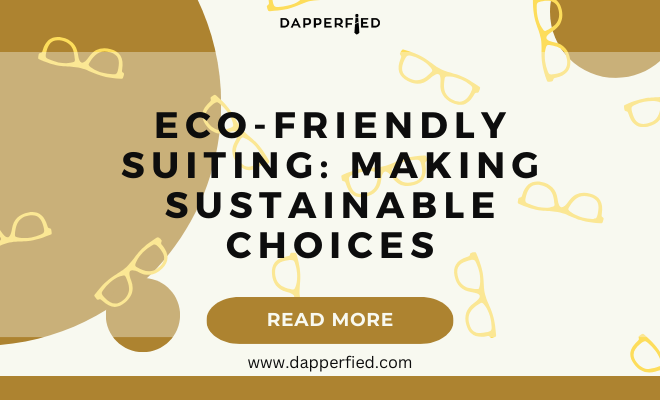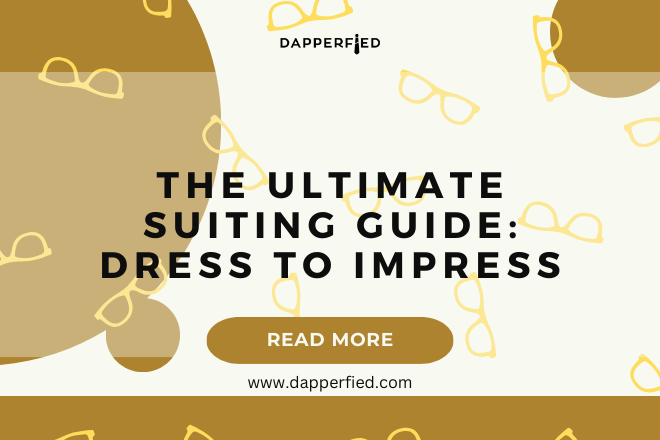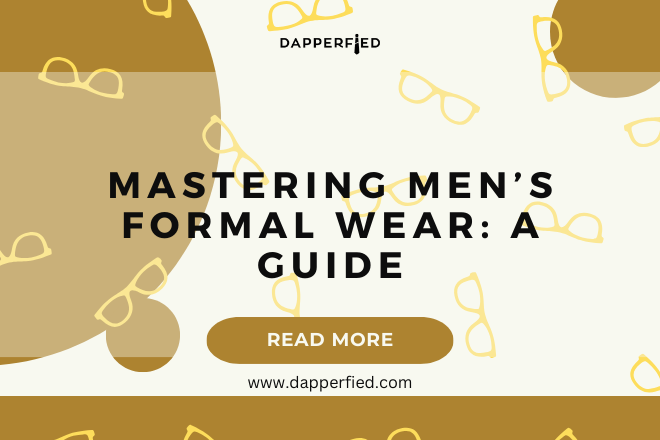
Men's Style
Eco-Friendly Suiting: Making Sustainable Choices
Eco-friendly suiting refers to the practice of choosing sustainable and environmentally friendly options when it comes to men’s suits. In today’s world, where climate change and environmental degradation are major concerns, sustainable fashion has become increasingly important. The fashion industry is known for its significant impact on the environment, from the production of textiles to the disposal of clothing. By opting for eco-friendly suiting, individuals can make a positive impact on the planet while still looking stylish and professional.
Key Takeaways
- Eco-friendly suiting is a sustainable fashion choice that benefits both the environment and the wearer.
- Choosing sustainable options in suiting can reduce waste, conserve resources, and promote ethical labor practices.
- When selecting eco-friendly suits, consider factors such as materials, production methods, and certifications.
- Men’s sustainable suiting styles include classic, modern, and casual options, with various colors and patterns available.
- To maintain and alter eco-friendly suits, use eco-friendly cleaning methods and seek out sustainable tailors.
Why Choose Sustainable Choices in Suiting
Traditional suiting has a significant environmental impact. The production of textiles, such as cotton and polyester, requires large amounts of water, energy, and chemicals. Additionally, the manufacturing process often involves harmful practices such as pesticide use and water pollution. Furthermore, the fast fashion industry promotes a culture of disposable clothing, leading to excessive waste and landfill accumulation.
Choosing eco-friendly options in suiting has numerous benefits. Firstly, it reduces the environmental footprint associated with the production and disposal of clothing. Sustainable materials and manufacturing processes minimize water usage, energy consumption, and chemical pollution. Secondly, eco-friendly suiting often prioritizes ethical considerations such as fair labor practices and worker rights. By supporting brands that prioritize these values, consumers can contribute to a more just and equitable fashion industry.
Suit Selection Tips for Eco-Friendly Suiting
When selecting eco-friendly suits, it is important to consider factors such as fit, quality, versatility, occasion, and dress code. Fit is crucial because a well-fitted suit not only looks better but also lasts longer. Investing in a high-quality suit made from sustainable materials ensures durability and longevity. Versatility is key as it allows for multiple outfit combinations and reduces the need for excessive clothing items.
Considering the occasion and dress code is also important when choosing an eco-friendly suit. Different events may have specific requirements in terms of formality and style. By selecting a suit that fits the occasion, individuals can avoid the need for multiple suits and reduce waste.
Men’s Suiting Styles for Sustainable Fashion
| Style | Material | Environmental Impact | Price Range |
|---|---|---|---|
| Classic Fit | Organic Cotton | Low | 100-300 |
| Slim Fit | Recycled Polyester | Medium | 150-400 |
| Tailored Fit | Bamboo | Low | 200-500 |
| Double Breasted | Hemp | Low | 250-600 |
| Three Piece | Wool | High | 300-800 |
When it comes to sustainable fashion, classic suit styles are timeless choices. These include the single-breasted suit, double-breasted suit, and three-piece suit. Classic suits are versatile and can be worn for various occasions, from formal events to business meetings.
In addition to classic styles, there are also trends in sustainable fashion that can be incorporated into men’s suiting. For example, sustainable brands often experiment with unique colors, patterns, and textures to create modern and stylish suits. By incorporating personal style preferences into eco-friendly suiting choices, individuals can express their individuality while still making sustainable choices.
Tailored Suit Guide for Eco-Friendly Suiting
Opting for tailored suits is a great choice for eco-friendly suiting. Tailored suits are made to measure, ensuring a perfect fit and reducing the need for alterations or replacements. This not only reduces waste but also extends the life of the suit.
Finding a sustainable tailor is essential when choosing tailored suits for eco-friendly suiting. Look for tailors who prioritize sustainable practices such as using organic or recycled materials and minimizing waste in their production process. Many sustainable tailors also offer customization options, allowing individuals to choose eco-friendly fabrics, linings, buttons, and other details.
Suit Buying Tips for Sustainable Choices

When buying suits sustainably, it is important to research brands and materials. Look for brands that prioritize sustainability in their production processes and use eco-friendly materials such as organic cotton, hemp, or recycled polyester. Avoid brands that engage in unethical practices such as sweatshop labor or excessive waste generation.
Shopping secondhand or vintage is another great way to make sustainable choices in suiting. By purchasing pre-owned suits, individuals can extend the life cycle of clothing items and reduce the demand for new production. Thrift stores, consignment shops, and online platforms are great places to find secondhand suits.
Investing in quality pieces is also crucial for sustainable suiting. High-quality suits are more durable and can withstand the test of time. By choosing well-made suits, individuals can avoid the need for frequent replacements and reduce waste.
Men’s Formal Wear for Eco-Friendly Events
Sustainable options for formal events such as weddings are becoming increasingly popular. Many sustainable brands offer formal wear options such as tuxedos and dress suits made from eco-friendly materials. By choosing these options, individuals can look stylish while still making sustainable choices.
When it comes to dress codes and etiquette for formal events, it is important to follow the guidelines provided by the hosts. However, there are often ways to incorporate sustainable choices within these guidelines. For example, opting for a rental tuxedo or borrowing a suit from a friend can reduce the need for purchasing a new suit.

Accessorizing sustainably is also important when it comes to formal wear. Choose accessories made from sustainable materials such as recycled metals or organic fabrics. Additionally, consider renting accessories instead of purchasing them if they will only be worn once.
Materials and Fabrics for Sustainable Suiting
There are several eco-friendly materials and fabrics that can be used in sustainable suiting. Organic cotton is a popular choice as it is grown without the use of harmful pesticides or synthetic fertilizers. Hemp is another sustainable option as it requires less water and pesticides compared to other crops.
Recycled polyester is a fabric made from recycled plastic bottles and other post-consumer waste. It has a lower environmental impact compared to virgin polyester, which is derived from fossil fuels. Wool is also a sustainable choice when sourced from ethically raised sheep and processed using environmentally friendly methods.
When considering materials and fabrics for sustainable suiting, it is important to weigh the benefits and drawbacks of each option. For example, while organic cotton is sustainable, it requires large amounts of water for cultivation. Similarly, while wool is a natural and renewable resource, the production process can involve harmful practices such as mulesing.
Eco-Friendly Alterations and Maintenance for Suits
To extend the life of a suit and make it more sustainable, there are several alterations and maintenance tips to consider. Firstly, avoid over-washing suits as this can cause unnecessary wear and tear. Instead, spot clean stains and air out the suit to remove odors.
When it comes to dry cleaning, opt for eco-friendly options that use non-toxic solvents and minimize waste. Look for dry cleaners that offer wet cleaning or carbon dioxide cleaning as alternatives to traditional dry cleaning methods.
Repairing and repurposing suits is another great way to make them more sustainable. If a suit has minor damages such as loose buttons or small tears, consider repairing them instead of discarding the entire suit. Additionally, if a suit no longer fits or is no longer in style, consider repurposing it into other clothing items or accessories.
Brands and Designers for Eco-Friendly Suiting
There are numerous sustainable fashion brands and designers that offer eco-friendly suiting options. Some popular brands include Patagonia, Eileen Fisher, and Reformation. These brands prioritize sustainability in their production processes and offer a range of suits made from eco-friendly materials.
In addition to established brands, there are also emerging designers who specialize in sustainable suiting. These designers often experiment with unique styles and materials to create innovative and eco-friendly suits. Online platforms such as Etsy are great places to discover these designers and support their work.
In conclusion, eco-friendly suiting is an important aspect of sustainable fashion in today’s world. By choosing sustainable options in suiting, individuals can reduce their environmental impact while still looking stylish and professional. From selecting the right fit and quality to considering the occasion and dress code, there are several tips to keep in mind when choosing eco-friendly suits. Classic suit styles, tailored suits, and secondhand options are all great choices for sustainable suiting. Additionally, materials such as organic cotton, hemp, and recycled polyester offer eco-friendly alternatives to traditional fabrics. By following these tips and supporting sustainable brands and designers, individuals can make a positive impact on the fashion industry and the planet.
If you’re interested in sustainable fashion choices, you might also want to check out this article on Dapperfied about eco-friendly watches. In particular, the Citizen Men’s BM7170-53L Titanium Eco-Drive Watch is worth considering. This watch not only looks stylish but also utilizes eco-drive technology, which means it is powered by light and doesn’t require a battery. It’s a great example of how sustainable choices can be incorporated into everyday accessories. Read more here.

FAQs
What is sustainable suiting?
Sustainable suiting refers to the use of eco-friendly materials and ethical production methods in the manufacturing of suits. It aims to reduce the environmental impact of the fashion industry and promote social responsibility.
What are some eco-friendly materials used in sustainable suiting?
Eco-friendly materials used in sustainable suiting include organic cotton, linen, hemp, bamboo, recycled polyester, and Tencel. These materials are grown or produced using sustainable methods and have a lower impact on the environment compared to traditional materials like polyester and nylon.
What are some ethical production methods used in sustainable suiting?
Ethical production methods used in sustainable suiting include fair labor practices, safe working conditions, and reduced waste. Sustainable suiting brands often prioritize transparency and traceability in their supply chains to ensure that their products are made in an ethical and responsible manner.
Why is sustainable suiting important?
Sustainable suiting is important because the fashion industry is one of the most polluting industries in the world. By choosing sustainable suiting options, consumers can reduce their environmental impact and support ethical production practices. Additionally, sustainable suiting can help promote a more circular economy by reducing waste and extending the lifespan of clothing.
Where can I find sustainable suiting options?
There are a growing number of sustainable suiting brands and retailers that offer eco-friendly and ethical options. Some popular sustainable suiting brands include Reformation, Everlane, and Patagonia. Additionally, many traditional suiting brands are starting to incorporate sustainable materials and production methods into their collections.
















